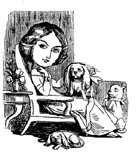
It’s Tricki Woo’s World Now
OUR RELATIONSHIPS WITH PETS HAVE GONE WRONG
Not long after we began dating, the woman who is now my wife introduced me to James Herriot. Her parents had read aloud from his stories to her and her siblings. She continued the tradition by reading aloud to me from All Creatures Great and Small on various car rides. Herriot’s books might not qualify as great literature, but they’re certainly good books, by turns touching, charming, hilarious, and heartbreaking.
James Herriot was the pen name of James Alfred Wright, a Scottish veterinarian who practiced in rural England from 1940 onward, with brief time off (if that’s the right term) for a stint with the Royal Air Force during the Second World War. His books are semi-autobiographical, chronicling his practice. They are not somber, but there’s a melancholic tone that softly reverberates throughout his books, for Herriot is aware that the world he is describing is fading away even as he writes. A similar fate befell the archetypal hero of his stories: the small-time Yorkshire farmer, who was one of the many casualties of the “progress” that came crashing in at war’s end.
Most of Herriot’s stories involve what one presumes is ordinary, rural veterinarian practice, which is to say, a lot of cows and sheep, with some horses and pigs thrown in. He assists animals giving birth and provides medical assistance when animals are unwell; he empathizes with owners he cannot help; and, more frequently, he enjoys their hospitality and shares in their joy. Despite the provincial nature of the practice, there is a surprising variety in the stories.
Among the usual farm fauna of All Creatures Great and Small are a few oddities, one of the more amusing of which belongs to an elderly widow named Mrs. Pumphrey. She lives in high style on the outskirts of Darrowby, the fictional Yorkshire town in which Herriot practices. Mrs. Pumphrey calls on Herriot not to help her with her cows or sheep but with her dog, Tricki Woo, “a Pekingese and the apple of his mistress’ eye.”
You May Also Enjoy
The truth of the Incarnation and the Mystical Body of Christ offers both hope for loved ones lost and an exemplar to be emulated in our relating to the dead.
Brownson argues that Man grasps the universal only through a particular (and inevitably divisive) set of loyalties, as opposed to a watery eclecticism.
Artists are prophetic because they see and experience what those at a distance take longer to see.

